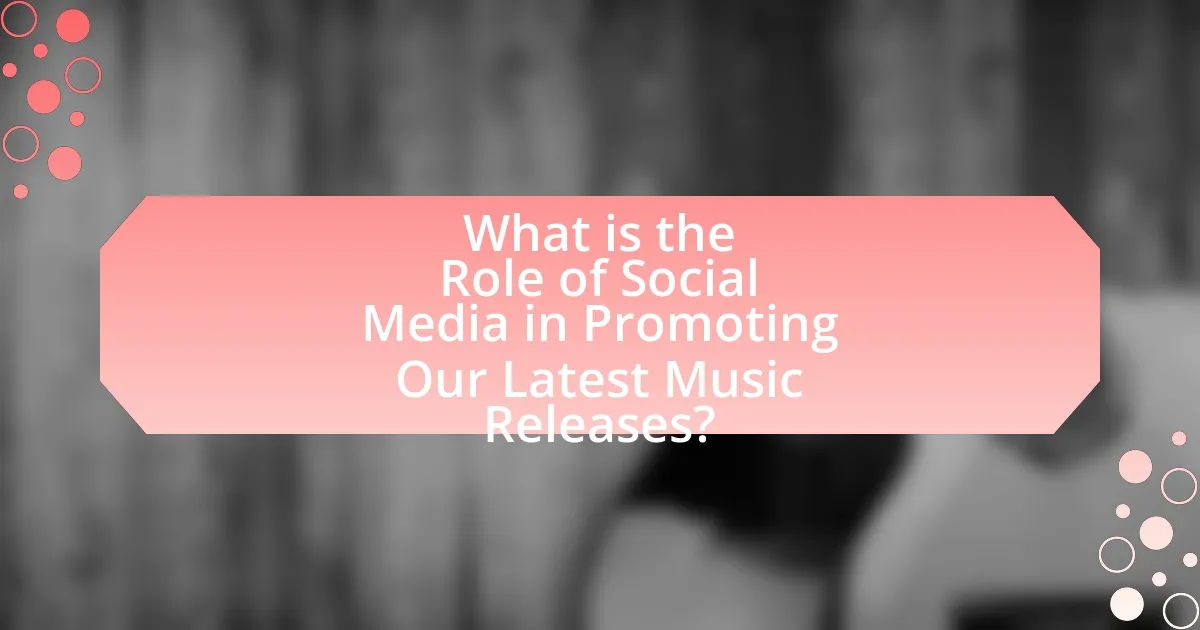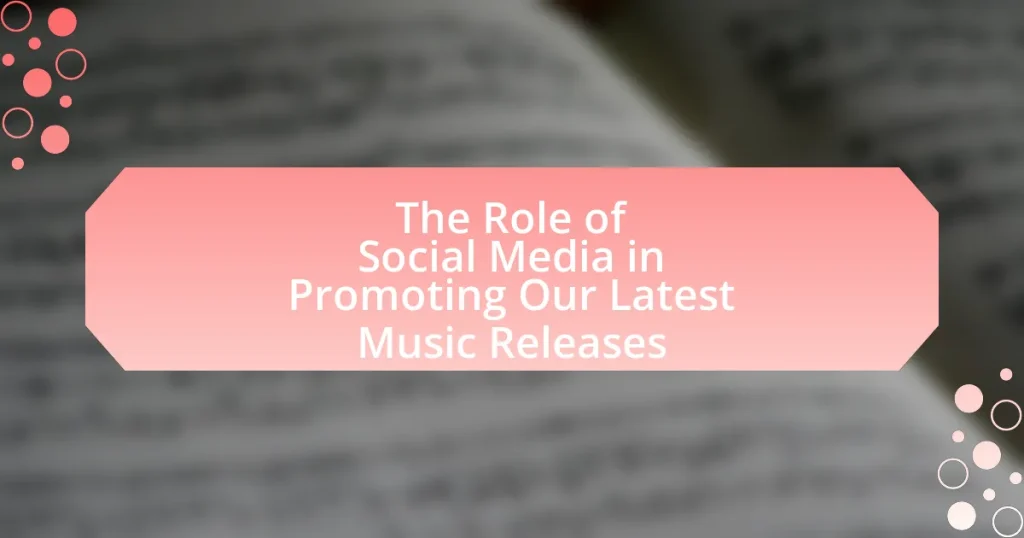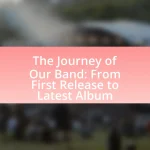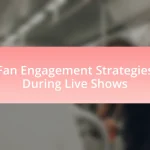The article focuses on the critical role of social media in promoting the latest music releases. It highlights how platforms like Instagram, TikTok, and Facebook enable artists to engage directly with their audience, facilitating real-time feedback and community building. Key points include the effectiveness of targeted advertising, the influence of algorithms on music visibility, and strategies for artists to enhance their brand presence. Additionally, the article discusses the advantages of social media over traditional marketing, the importance of audience engagement, and best practices for content creation and performance measurement.

What is the Role of Social Media in Promoting Our Latest Music Releases?
Social media plays a crucial role in promoting the latest music releases by providing a platform for artists to engage directly with their audience. This engagement allows for real-time feedback, sharing of content, and building a community around the music. According to a 2021 report by the International Federation of the Phonographic Industry, 75% of music consumers discover new music through social media platforms, highlighting their effectiveness in reaching potential listeners. Additionally, targeted advertising on platforms like Facebook and Instagram enables artists to reach specific demographics, increasing the likelihood of their music being heard and shared.
How does social media influence music promotion?
Social media significantly influences music promotion by providing artists with direct access to their audience, enabling real-time engagement and feedback. Platforms like Instagram, TikTok, and Twitter allow musicians to share content, such as music videos and behind-the-scenes footage, which can lead to viral trends and increased visibility. For instance, a study by the University of Southern California found that 70% of music consumers discover new artists through social media platforms. This direct interaction fosters a sense of community and loyalty among fans, which is crucial for an artist’s growth and success in the competitive music industry.
What platforms are most effective for music promotion?
The most effective platforms for music promotion are social media networks such as Instagram, TikTok, and Facebook. These platforms enable artists to reach large audiences through engaging content, targeted advertising, and community interaction. For instance, TikTok has become a significant driver of music discovery, with songs going viral and leading to increased streams; a study by the National Music Publishers’ Association found that 75% of TikTok users discover new music on the platform. Similarly, Instagram’s visual storytelling capabilities allow artists to showcase their music and connect with fans, while Facebook’s extensive user base provides opportunities for targeted ads and event promotion.
How do algorithms affect music visibility on social media?
Algorithms significantly influence music visibility on social media by determining which content is shown to users based on their preferences and engagement patterns. These algorithms prioritize posts that generate higher interaction rates, such as likes, shares, and comments, thereby increasing the likelihood that popular music content will be seen by a broader audience. For instance, platforms like Instagram and TikTok utilize machine learning to analyze user behavior, promoting music that aligns with trending topics or resonates with specific demographics. This mechanism can lead to viral exposure for certain tracks, as seen with songs that gain traction through challenges or user-generated content, ultimately impacting an artist’s reach and success in the digital landscape.
Why is social media essential for music artists today?
Social media is essential for music artists today because it provides a direct platform for engagement with fans and promotes music releases effectively. Artists can share updates, behind-the-scenes content, and new music directly with their audience, fostering a sense of community and loyalty. According to a 2021 report by the International Federation of the Phonographic Industry, 75% of music consumers discover new music through social media platforms, highlighting its critical role in music promotion. Additionally, social media allows for targeted advertising, enabling artists to reach specific demographics and increase their visibility in a crowded market.
What advantages does social media provide over traditional marketing?
Social media offers several advantages over traditional marketing, primarily through its ability to reach a larger audience at a lower cost. Unlike traditional marketing methods, which often require significant financial investment for print, television, or radio ads, social media platforms allow for targeted advertising with precise demographic filters, enabling marketers to engage specific audiences effectively. For instance, a study by HubSpot found that social media marketing costs 62% less than traditional marketing while generating approximately three times as many leads. Additionally, social media facilitates real-time interaction and engagement with audiences, fostering community and brand loyalty, which traditional marketing lacks. This immediacy and interactivity enhance customer relationships and provide valuable feedback, further optimizing marketing strategies.
How does social media help in building an artist’s brand?
Social media helps in building an artist’s brand by providing a platform for direct engagement with fans and showcasing their work. Artists can share their music, visuals, and personal stories, which fosters a deeper connection with their audience. According to a 2021 survey by the International Music Summit, 70% of music consumers discover new artists through social media platforms, highlighting its effectiveness in brand visibility. Additionally, social media allows for targeted advertising and analytics, enabling artists to reach specific demographics and measure engagement, further solidifying their brand presence in the competitive music industry.
What strategies can artists use on social media for music promotion?
Artists can use targeted content creation, audience engagement, and strategic partnerships on social media for music promotion. Targeted content creation involves sharing high-quality visuals, behind-the-scenes footage, and engaging stories that resonate with their audience, which can increase visibility and connection. Audience engagement is crucial; artists should interact with fans through comments, live sessions, and Q&A formats to build a loyal community. Strategic partnerships with influencers or other artists can amplify reach, as collaborations often introduce music to new audiences. According to a 2021 report by the International Federation of the Phonographic Industry, 70% of music consumers discover new music through social media platforms, highlighting the effectiveness of these strategies in reaching potential listeners.
How can artists effectively engage with their audience?
Artists can effectively engage with their audience by utilizing social media platforms to create interactive content and foster direct communication. By sharing behind-the-scenes footage, hosting live Q&A sessions, and encouraging user-generated content, artists can build a community around their music. Research indicates that 70% of consumers feel more connected to brands when the CEO is active on social media, highlighting the importance of personal interaction. Additionally, platforms like Instagram and TikTok allow artists to reach wider audiences through targeted advertising and viral trends, enhancing their visibility and engagement.
What types of content should artists share to promote their music?
Artists should share a variety of content types to effectively promote their music, including music videos, behind-the-scenes footage, live performance clips, and engaging visuals such as album artwork. Music videos serve as a primary medium for storytelling and visual engagement, often leading to higher viewer retention and sharing rates. Behind-the-scenes footage provides fans with an intimate look at the creative process, fostering a deeper connection. Live performance clips showcase the artist’s energy and talent, encouraging attendance at future shows. Engaging visuals, like album artwork, can capture attention and enhance brand identity. According to a study by the International Federation of the Phonographic Industry, visual content significantly increases audience engagement, making it essential for artists to utilize these formats in their promotional strategies.
How can artists measure the success of their social media campaigns?
Artists can measure the success of their social media campaigns through key performance indicators (KPIs) such as engagement rates, follower growth, and conversion metrics. Engagement rates, which include likes, shares, and comments, indicate how well the audience interacts with the content. For instance, a study by Sprout Social found that posts with higher engagement rates lead to increased visibility and reach, enhancing overall campaign effectiveness. Follower growth reflects the expanding audience base, while conversion metrics, such as click-through rates to music streaming platforms or merchandise sales, provide direct evidence of the campaign’s impact on revenue. By analyzing these metrics, artists can gain insights into their audience’s preferences and the overall effectiveness of their promotional strategies.
What metrics should artists track to evaluate performance?
Artists should track metrics such as engagement rate, follower growth, reach, and conversion rate to evaluate performance. Engagement rate, calculated by the total interactions (likes, comments, shares) divided by total followers, indicates how well content resonates with the audience. Follower growth measures the increase in audience size over time, reflecting the effectiveness of promotional strategies. Reach quantifies the total number of unique users who see the content, providing insight into visibility. Conversion rate, which tracks the percentage of users taking a desired action (like streaming a song or purchasing merchandise), assesses the effectiveness of social media campaigns in driving sales or streams. These metrics collectively offer a comprehensive view of an artist’s performance on social media platforms.
How can feedback from social media inform future releases?
Feedback from social media can inform future releases by providing direct insights into audience preferences and reactions. Analyzing comments, shares, and likes allows artists and labels to identify which elements of their music resonate most with listeners. For instance, a study by Nielsen Music found that 56% of music fans discover new music through social media platforms, indicating that engagement metrics can guide decisions on genre, style, and marketing strategies for upcoming releases. By leveraging this data, creators can tailor their work to better align with audience expectations, ultimately enhancing the success of future projects.
What challenges do artists face when using social media for promotion?
Artists face several challenges when using social media for promotion, including algorithm changes, oversaturation of content, and audience engagement. Algorithm changes on platforms like Instagram and Facebook can limit the visibility of posts, making it difficult for artists to reach their target audience effectively. Additionally, the oversaturation of content means that artists must compete with a vast number of other creators, which can dilute their message and reduce engagement rates. Furthermore, maintaining consistent audience engagement is challenging, as artists must continually create fresh content and interact with followers to keep their audience interested. These factors collectively hinder artists’ promotional efforts on social media.
How can artists overcome negative feedback on social media?
Artists can overcome negative feedback on social media by actively engaging with their audience and using constructive criticism to improve their work. By responding to feedback thoughtfully, artists can demonstrate their willingness to listen and adapt, which can foster a more positive relationship with their followers. Research indicates that artists who engage with their audience tend to build stronger communities and enhance their reputation, as seen in studies showing that 70% of consumers feel more connected to brands that respond to their feedback. This proactive approach not only mitigates the impact of negative comments but also transforms potential detractors into supporters.
What are common pitfalls to avoid in social media marketing?
Common pitfalls to avoid in social media marketing include inconsistent branding, neglecting audience engagement, and failing to analyze performance metrics. Inconsistent branding can confuse followers and dilute brand identity, as studies show that consistent presentation increases brand recognition by up to 80%. Neglecting audience engagement leads to missed opportunities for building relationships and community, which are crucial for loyalty; research indicates that brands that actively engage with their audience see a 20-40% increase in customer satisfaction. Lastly, failing to analyze performance metrics prevents marketers from understanding what strategies work, with data revealing that 70% of marketers who track their social media performance report improved results.
How can artists integrate social media with other promotional strategies?
Artists can integrate social media with other promotional strategies by using platforms to amplify traditional marketing efforts, such as live performances and merchandise sales. For instance, artists can create engaging content on social media that promotes upcoming concerts, encouraging followers to purchase tickets through links shared in posts. Additionally, artists can collaborate with influencers to reach wider audiences, leveraging their social media presence to drive traffic to their music streaming platforms or websites. Research shows that 79% of marketers believe that user-generated content on social media significantly boosts engagement, indicating that artists can benefit from encouraging fans to share their experiences and content related to the artist’s work. This synergy between social media and traditional promotional methods enhances visibility and fosters a stronger connection with the audience.
What role does collaboration play in social media promotion?
Collaboration significantly enhances social media promotion by leveraging the combined audiences and resources of multiple parties. When artists, influencers, or brands collaborate, they create content that reaches a broader demographic, increasing visibility and engagement. For instance, a study by the Pew Research Center found that 72% of teenagers use Instagram, making it a prime platform for collaborative promotions that can tap into this audience effectively. Additionally, collaborations often lead to cross-promotion, where each party shares the content with their followers, amplifying reach and fostering community engagement. This strategic partnership not only boosts follower counts but also enhances credibility, as audiences are more likely to trust recommendations from familiar figures.
How can live events enhance social media engagement?
Live events enhance social media engagement by creating real-time interactions and fostering a sense of community among attendees. When individuals participate in live events, they often share their experiences on social media platforms, using event-specific hashtags and tagging relevant accounts, which increases visibility and reach. According to a study by Eventbrite, 95% of event attendees share content related to the event on social media, amplifying the event’s online presence. This sharing behavior not only promotes the event itself but also encourages others to engage with the brand or artist, leading to increased followers and interactions on social media channels.
What are best practices for promoting music on social media?
Best practices for promoting music on social media include creating engaging content, utilizing targeted advertising, and interacting with followers. Engaging content, such as behind-the-scenes videos, live performances, and interactive polls, captures audience attention and encourages sharing. Targeted advertising on platforms like Facebook and Instagram allows artists to reach specific demographics, increasing the likelihood of engagement and conversion. Interacting with followers through comments, direct messages, and live Q&A sessions fosters a sense of community and loyalty among fans. According to a 2021 report by the International Federation of the Phonographic Industry, 70% of music consumers discover new music through social media, highlighting the effectiveness of these practices.
How can artists create a consistent posting schedule?
Artists can create a consistent posting schedule by planning their content in advance and utilizing scheduling tools. By establishing a content calendar, artists can outline what to post and when, ensuring regular engagement with their audience. Research indicates that brands that post consistently see a 67% increase in engagement, highlighting the importance of regularity in social media interactions. Additionally, tools like Hootsuite or Buffer allow artists to automate their posts, further maintaining consistency without the need for daily manual updates.
What tools can assist artists in managing their social media presence?
Artists can utilize tools like Hootsuite, Buffer, and Later to effectively manage their social media presence. Hootsuite allows users to schedule posts across multiple platforms, track engagement metrics, and monitor brand mentions, making it easier for artists to maintain a consistent online presence. Buffer offers similar scheduling capabilities and provides analytics to help artists understand their audience better. Later specializes in visual content planning, which is particularly beneficial for artists who rely on imagery to promote their work. These tools enhance efficiency and engagement, enabling artists to focus more on their creative processes while effectively managing their social media interactions.


